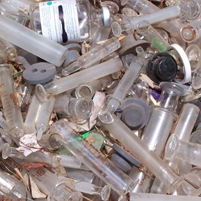Medical Waste a Growing Problem in Disposable Era
Monday, July 12, 2010

Hospitals and doctors’ offices throw away an enormous amount of used, and unused, medical supplies and equipment each year, prompting advocates to call on the industry to address the mountain of waste. Some medical professionals are beginning to heed the cries of change and at least are discussing how doctors and nurses can behave more “green” in society and stop discarding several billion pounds of garbage annually.
For instance, Practice Greenhealth, which counts 1,100 hospitals and 80 companies as members, recently announced an initiative called “Greening the O.R.” which is intended to examine the best sustainable practices for reducing operating-room garbage, energy consumption and indoor air quality problems, while lowering expenses and improving safety, reports The New York Times. Operating rooms are said to produce 20%-30% of all hospital waste.
Traditionally, the medical industry used reusable devices made of metal, rubber or glass. However, fears of inadequate disinfection techniques in the 1980s led to a shift to disposable devices, often made of plastic. Although it soon became clear that sterilization techniques did destroy even the HIV virus, the profits to be made from disposable devices led to the trend to throwaways continuing anyway.
-Noel Brinkerhoff, David Wallechinsky
In a World of Throwaways, Making a Dent in Medical Waste (by Ingfei Chen, New York Times)
- Top Stories
- Unusual News
- Where is the Money Going?
- Controversies
- U.S. and the World
- Appointments and Resignations
- Latest News
- Trump to Stop Deportations If…
- Trump Denounces World Series
- What If China Invaded the United States?
- Donald Trump Has a Mental Health Problem and It Has a Name
- Trump Goes on Renaming Frenzy






Comments